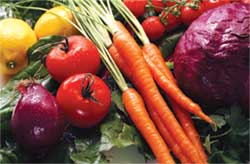Shrinkage in Supermarket Produce Departments
Shrinkage of retail fruit and vegetable displays can be minimized by using low UV and balanced spectrum display case lighting. Ultraviolet light and the yellow segments of the visible spectrum hasten the ripening process in produce and exacerbate loss from dehydration and spoilage.
Effects of Retail Display Case Lighting on Fruits and Vegetables
Many of the vegetables that we eat grow underground or in the dark, and are exposed to light for the first time when they are put on display in retail produce outlets. The UV and visible spectrum radiation from display lighting can increase the surface temperature of displayed merchandise and initiate or enhance chemical and organic processes that change the appearance, texture, and flavor of the vegetables.
Radishes are bright red when they are first harvested, but they become faded when exposed to light. Regular display lighting can cause other root vegetables such as carrots, beets, and parsnips to continue to grow. Bulbs such as onions, garlic, and shallots begin to sprout when exposed to light, and the outer layers turn green. Tender bean sprouts and other sprouting seeds continue to grow, becoming tough. These effects can be minimized by using low UV lighting with a balanced visible spectrum, such as Promolux fluorescent lamps or LEDs.
Premature Ripening of Grocery Store Fruit Displays from Ethylene Gas

Under Promolux lighting, produce remains crisp and vibrant in color. Light accelerates the ripening process of fruit. Even though fruits are often harvested before they are ripe, with prolonged exposure to UV and visible spectrum radiation emitted by most display case lighting, fruit such as bananas, berries, and apricots become overripe. In the ripening process, ethylene gas is released, which in turn initiates ripening in nearby fruits and vegetables. Eventually the ethylene will lead to decay and rot. Stone fruits such as apricots, peaches, and cherries are particularly susceptible.
Ethylene can make bulb vegetables such as onions spoil prematurely, and turn soft fruits such as raspberries, strawberries, blueberries, and red currants mushy and unsellable. Ideally fruits and vegetables should be stored in a cool, dark place, away from the adverse effects of lighting sources. When they need to be displayed, the ripening process will be slower under Promolux low UV lamps and LEDs.
Shrinkage of Retail Fruit and Vegetable Displays
Leafy green vegetables decay and wilt prematurely under the heat from regular supermarket produce display case lighting, causing supermarket salad bars and buffets to lose their freshness and appeal. In grocery stores, produce shrinkage from dehydration can be as high as $1 per foot per day, even when the produce displays are misted regularly.
Dryness, heat and radiation from display case lighting causes fresh herbs, cut fruits, and fruit salads to become dehydrated and wilted. Loss from shrinkage is especially high for leafy green vegetables and soft fruit and berries, since they dehydrate quickly and look unappealing.
